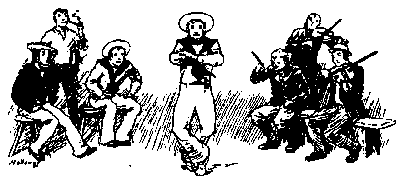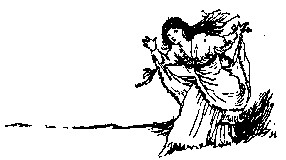Gilbert & Sullivan Opera
A History and a Comment
by H. M. Walbrook
CHAPTER XI.
"RUDDYGORE" AND "RUDDIGORE."

The year of Queen Victoria's first jubilee had come, and, even in the January of that splendid 1887, people were reading and talking about little else than Her Majesty and the coming pageant. Yet the affairs of the Savoy Theatre were also felt to be of no small importance; and when, on Wednesday, January 19th, the first long run of The Mikado ended and the theatre was closed for two nights while the finishing touches were being given to its successor, gossip and speculation ranged round the coming opera with the ominous title of Ruddygore. Thus, at least, the new piece was announced and actually produced. Very shortly after, the y was converted into an i, under circumstances which will be explained later on.
On Saturday night, January 22nd, 1887, the entirely new supernatural opera in two Acts, entitled Ruddygore, or The Witch's Curse, was produced for the first time. The Prince and Princess of Wales (afterwards King Edward VII. and Queen Alexandra) had intended to be present, but were prevented at the last moment, and their box was occupied by the Lord Mayor and Lady Mayoress of London. Others in the audience were Lord and Lady Randolph Churchill, Sir Charles (afterwards Lord Chief Justice) and Lady Russell, Mr. Henry Labouchere, Mr. Archibald Forbes, W. (afterwards Sir) George Lewis, and the prima donna, Madame Albani. In the interval between the Acts an opera glass fell from the Lord Mayor's box and missed the head of the distinguished singer by about three inches — just as on the preceding Boxing-night an empty sodawater bottle had dropped from the gallery of Drury Lane Theatre and narrowly missed the head of a judge of the High Court. Such are the perils of these exciting occasions!
Years later, Gilbert declared Ruddigore to be one of his three favourites, the others being Utopia and The Yeomen of the Guard. Yet its first night was not completely successful. The first Act went magnificently, as indeed it well might, being one of the perfect things of Art, and at the end of it the players were called and recalled, and the pit and gallery crowded out to its entr'acte refreshment whistling "Hail the Bride groom — hail the Bride!" The second Act, with its metaphysical scenes of the ghosts of the dead Murgatroyds, was less successful, probably as a result of the ill-considered though well-meant Puffs Preliminary in which certain writers in the Press had been allowed to indulge, and which had prepared the audience for a sort of Grand Opera scene of tragic power. George Grossmith, too, the Robin Oakapple, had once more on a first night failed to do himself justice, forgetting his lines and evincing a lack of his usual decision in his "business," while Miss Leonora Braham, the Rose Maybud, was in poor voice and also had to be prompted, no doubt as a result of nervousness. However, the general charm of the opera soon made itself felt; it drew the old crowds during a run of 288 performances (excelling that of The Sorcerer by 113 and that of Princess Ida by 42), and still stands very high indeed in the estimation of lovers of a witty "book" and a fascinating score.
Not one of its predecessors had been so expensively mounted. For instance, the chorus of Bucks and Blades in the first Act were attired as officers of the following regiments in the British Army tempore 1815:
|
7th Hussars. Royal Engineers. 3rd Dragoon Guards. 19th Lancers. Scots Guards. 1st Life Guards. Royal Horse Guards. 12th Light Dragoons. 87th Regiment. 10th Hussars. |
18th Hussars. Royal Horse Artillery. 9th Lancers. 17th Light Dragoons. Grenadier Guards. 8th Light Dragoons. 52nd Light Infantry. Coldstream Guards. Royal Artillery. 15th Hussars. |
-or twenty regiments and battalions, all correctly accoutred. No less a person than Field-Marshal Lord Wolseley had consented on the author's invitation to attend the dress rehearsal and inspect these uniforms, but a professional engagement kept him away. As a mark of his sense of the importance of the occasion, however, he sent the Quartermaster-General, Sir Arthur Herbert, who duly made a careful inspection and pronounced everything correct to the last button. These uniforms and the "properties" of the production alone cost £6,000. The two scenes, a charming Cornwall coast scene and the elaborate one of the haunted gallery in Ruddigore Castle, cost another 2,000.
In some queer way the idea got abroad that Ruddigore was not a success: that it was, in fact, a failure. In a speech at a dinner given to him and the Savoy artistes by the O.P. Club nineteen years after, Sir W. S. Gilbert referred to this story in the following terms:
We were credited, or discredited, with one conspicuous failure, Ruddigore, or The Witch's Curse. Well, it ran eight months and, with the sale of the libretto, put £7,000 into my pocket. It was not generally known that, bending before the storm of Press execration aroused by the awful title, we were within an ace of changing it from Ruddygore to Kensington Gore, or Robin and Richard were two Pretty Men.
A letter to the papers, from Mr. George Edwardes, the manager of the Gaiety, also alluded to the "failure" of Ruddigore, and rather rashly suggested that it might perhaps have been less of a failure had the comedians in it been allowed to "gag" their parts as was the custom at his theatre! Gilbert replied calmly to this that the ideals aimed at in the Savoy Theatre were not precisely those aimed at in the Gaiety, and after that Mr. Edwardes wisely said no more. On the whole, perhaps, a good many dramatic authors today would be comparatively content with even a succession of "failures" each of which brought them in £7,000 in two-thirds of a year!
The opera satirizes early transpontine melodrama, conventional stage madness, the swagger of fire-eating patriotism and the methods of the stage ballerina. The book is rich in the characteristic Gilbertian touch. In the modest village in which the first Act is laid there is a troupe of "professional bridesmaids" endowed by a pious charity to be "on duty from ten till four," in full costume, and ready to "support" any local bride. The heroine, Rose Maybud, artlessly describes herself as "sweet Rose Maybud," and goes about with a little basket on her arm on errands of charity to deserving villagers, such as "some peppermint rock for old gaffer Gadderby, a set of false teeth for pretty little Ruth Rowbottom, and a pound of snuff for the poor orphan girl on the hill." The hero's dearest friend, having stolen his sweetheart by a trick in a scene of the wildest farce, immediately proceeds to sing with that young lady one of the prettiest duets, both in the words and in the music, Gilbert and Sullivan ever wrote. Furthermore, this worthy has so much respect for his heart that he never even mentions it without raising his hat. When the portraits in the Ruddigore gallery come to life the following conversation takes place between Robin and one of them:
- ROBIN:
- I recognise you now — you are the picture that hangs at the end of the gallery.
- SIR RODERIC:
- In a bad light. I am.
- ROBIN:
- Are you considered a good likeness
- SIR RODERIC:
- Pretty well. Flattering.
- ROBIN:
- Because as a work of art you are poor.
- SIR RODERIC:
- I am crude in colour, but I have only been painted ten years. In a couple of centuries I shall be an Old Master, and then you will be sorry you spoke lightly of me,
and the refrain of one of Robin's songs is the familiar —
- If you wish in the world to advance
- Your merits you're bound to enhance,
- You must stir it and stump it,
- And blow your own trumpet,
- Or, trust me, you haven't a chance
lines which Worldly Wisdom may yet order to be printed and hung up in every school in the country!
The music is full of beauties. The long madrigal, "When the buds are blossoming," in the first Act, is one of Sullivan's richest, and it has the peculiarity of being sung largely by the chorus almost without an accompaniment. To the duet, "The battle's roar is over," reference has already been made. Richard's spirited ballad, "I shipped, d'ye see, in a Revenue sloop," was misunderstood in the French Press as satirizing French valour, whereas, of course, it only satirizes British bragging. The music amid which, on a darkened stage, the spectre of Sir Roderic descends from his frame is wild and solemn to a degree; old Hannah's ballad, "There grew a little flower," is exquisite, and the duet, "I once was a very abandoned person," between Sir Despard and Mad Margaret in the second Act, with its incidental "blameless dances," makes one of the drollest pages. On the whole, most of those who know the book and score of Ruddigore at all well, will be disposed to agree with the estimate which its author placed upon it.
